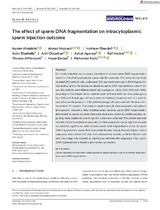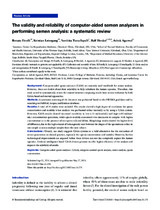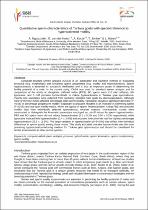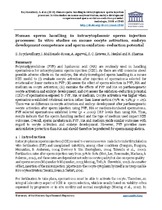The effect of sperm DNA fragmentation on intracytoplasmic sperm injection outcome

View/
Date
2021Author
Khalafalla, Kareim
Majzoub, Ahmad
Henkel, Ralf
Metadata
Show full item recordAbstract
Our study objective was to assess the effect of various sperm DNA fragmentation
levels on clinical intracytoplasmic sperm injection outcome. This retrospective study
included 392 patients who underwent ICSI and performed sperm DNA fragmentation testing before the procedure. Based on sperm DNA fragmentation cut-off values, the patients were differentiated into 3 groups as <20%, 20%–30% and >30%.
According to the female status, patients were differentiated into favourable group
(n = 259) with female age <35 years and anti-Mullerian hormone level ≥7.1 pmol/L;
and unfavourable group (n = 133) with female age ≥35 years and anti-Mullerian hormone level ≤7.1 pmol/L. The patient's medical records were reviewed, and patient's
demographic, laboratory data including semen analysis, sperm DNA fragmentation
determined by means of sperm chromatin dispersion, hormonal profile and data regarding intracytoplasmic sperm injection cycle were collected.
Collections
Related items
Showing items related by title, author, creator and subject.
-
The validity and reliability of computer-aided semen analyzers in performing semen analysis: a systematic review
Leisegang, Kristian; Agarwal, Ashok; Renata, Finelli (Translational Andrology and Urology., 2021)Background: Computer-aided sperm analyzers (CASA) are currently used worldwide for semen analysis. However, there are doubts about their reliability to fully substitute the human operator. Therefore, this study aimed to ... -
Quantitative sperm characteristics of Tankwa goats with special reference to hyperactivated motility
Ngcauzele, Asanele; van der Horst, Gerhard; Kotze, A (South African Society for Animal Science, 2020)Computer-assisted semen analysis (CASA) is an automated and objective method of evaluating structural (e.g. morphology) and functional sperm parameters (e.g. motility and hyperactivation). Sperm hyperactivation is essential ... -
Human sperm handling in intracytoplasmic sperm injection processes: In vitro studies on mouse oocyte activation, embryo development competence and sperm oxidation–reduction potential
Roychoudhury, S.; Maldonado-Rosas, I.; Agarwal, A.; Esteves, S.C.; Henkel, Ralf; Sharma, Rajan (Wiley, 2018)Polyvinylpyrrolidone (PVP) and hyaluronic acid (HA) are routinely used in handling spermatozoa for intracytoplasmic sperm injection (ICSI). As there are still concerns about possible adverse effects on the embryo, this ...



